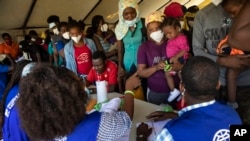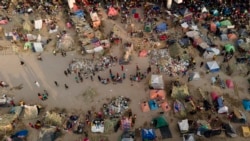The U.N. refugee agency is calling for an end to the expulsions and forcible deportations of Haitians massed at the U.S.-Mexican border.
Hundreds of mostly Haitian migrants and asylum seekers have been forcibly expelled by U.S. authorities under Title 42, public health related entry restrictions. Plans reportedly are under way to forcibly deport thousands more.
U.N. refugee spokeswoman Shabia Mantoo says her agency has been calling for an end to Title 42 for some time, and for the United States to ensure access to asylum for people whose lives depend on it.
“While some people arriving at the border may not be refugees, anyone who does have a claim or claims to have a well-founded fear of being persecuted in their country of origins, they should have access to asylum and to have their claim assessed before being subjected to expulsion or deportation,” she said.
The UNHCR has been calling for an end to Title 42 since it was enacted under the Trump administration last year, allegedly to stop the spread of COVID-19 into the United States.
The Biden Administration has continued this policy despite growing criticism.
Mantoo says there are ways to manage public health considerations and allow people in need of protection to seek asylum. She says these issues are not mutually exclusive. She says the right to seek asylum is a fundamental human right.
She says conflict, social, economic, humanitarian, and political situations in Haiti have led to different waves of mixed movements from the country in past decades.
“Some of those people in these movements may have well-founded grounds to request international protection. And we have been following these movements and what this does call for is a coordinated regional response to ensure effective and legalistic arrangements, including for those who do not require international protection. But in terms of the expulsions, we are closely monitoring the issue on both sides of the U.S. and Mexico border,” she said.
The U.N. human rights office expresses dismay at what it calls disturbing images of the ways in which migrants and asylum seekers have been transported to the Haitian capital, Port-Au-Prince. These include images of U.S. border patrol agents on horseback using what appear to be whips against the migrants.
U.N. officials say no serious assessment of the migrants’ situation, their fears, and their protection needs have been made. And this, they say, is of great concern.






